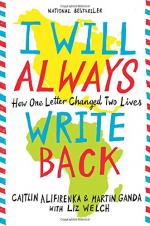|
This section contains 589 words (approx. 2 pages at 400 words per page) |

|
I Will Always Write Back Summary & Study Guide Description
I Will Always Write Back Summary & Study Guide includes comprehensive information and analysis to help you understand the book. This study guide contains the following sections:
This detailed literature summary also contains Topics for Discussion on I Will Always Write Back by Caitlin Alifirenka and Martin Ganda.
The following version of this book was used to create this study guide: Alifirenka, Caitlin; Ganda, Martin. I Will Always Write Back. Little, Brown, and Company, 2016, First Paperback Edition.
I Will Always Write Back is an autobiographical account by Caitlin Alifirenka and Martin Ganda (with Liz Welch) telling the story of their global friendship that began with simple pen pal letters in middle school. The book is told in alternating chapters written by Caitlin and Martin, and together, both lives form one single story. Pieces of letters, and entire letters between the two, also help form these chapters.
When Caitlin was 12, her seventh-grade teacher conducted a pen pal activity. Caitlin, who lived in Pennsylvania, chose to write to someone in Zimbabwe, because it was the last country on the list of countries to choose from, because she knew little about Africa, and because none of her friends decided to choose the country. Caitlin did not know to whom her letter would go, but was excited to write it anyways.
Caitlin’s letter ended up in the hands of a boy her age named Martin. Martin and his friends all loved America, so Martin was thrilled to receive a letter from a new American friend and write back. This began a six-year-long correspondence between the two. Through the letters, Martin and Caitlin came to have a deeper appreciation of one another, their countries, and their lives. Caitlin was especially heartbroken to learn about the horrible state of poverty in which Martin lived: Martin’s family shared a one-room apartment with holes in the walls and which had as its only piece of furniture a mattress upon which his parents slept, and beneath which he and his several siblings slept at night. Indeed, Martin’s family was so poor, and the economy was so bad in Zimbabwe, that Martin often had difficulty finding money even for stamps.
As Caitlin became aware of Martin’s situation, she began sending him money, and alerted her parents to his troubles. Not only did Caitlin’s parents send along money, but they also helped Caitlin to send along care packages with simple, everyday items that, though easy to find in America, were near impossible to afford in Zimbabwe, such as toothbrushes, shampoo, and clothing. Things were so bad that even the wealthiest families in Martin’s area could not afford Reebok t-shirts –something Caitlin easily bought on sale at a discount store in America and mailed to Martin in Zimbabwe –and Martin had to write one of his letters on a discarded ice cream wrapper. Because of the help of Caitlin and her family, Martin was able to attend an excellent high school where he worked hard and thrived.
Ultimately, Caitlin and her family continued to assist with Martin’s dreams of coming to America to study at school, helping him navigate the college process and helping him to find a scholarship to pay his tuition at nearby Villanova. When Caitlin and Martin finally met in August, 2003, just before college began, they were beyond thrilled to finally meet one another in person. Martin thanked God for Caitlin and her family, vowing to do good for all they had done for him. Martin and Caitlin both graduated from college. While Martin went on to a successful business career, Caitlin went into nursing, got married, and had children. Both Caitlin and Martin remained close friends, and later decided to write a book about their experiences, so that others could be inspired to do kind acts.
Read more from the Study Guide
|
This section contains 589 words (approx. 2 pages at 400 words per page) |

|



